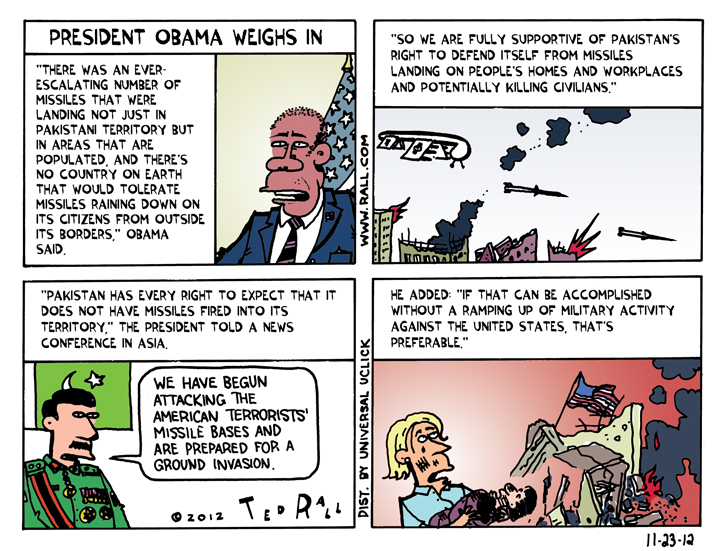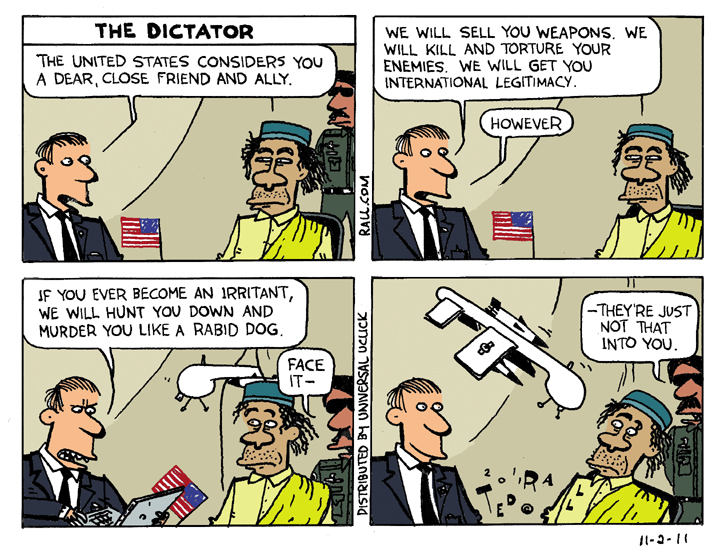The U.S. formally recognizes the Free Syrian Army, while declaring the Al-Nusra Front a terrorist group.
President Obama Weighs In
President Obama expresses his support for Israel’s right to defend itself from Hamas missiles originating in Gaza. He even says it would be OK for Israel to invade. Does the same rule apply to Pakistan, currently under fire by American missiles? Is it OK for Pakistan to invade the United States in order to defend itself?
SYNDICATED COLUMN: Sexual Freedom: The Next Frontier
No One Should Be Judged Because of How They Have Sex
If slavery was America’s original sin, Puritanism was its original curse.
In recent years the United States has made significant strides towards greater equality and freedom. Racism, sexism and other forms of bigotry have been significantly curtailed by new laws and cultural education. But we still have work to do. Four centuries after people so uptight they couldn’t get along with the British invaded the New World, however, the United States remains one of the most sexually repressed Western countries.
It is not good for us.
“If expression of sexuality is thwarted, Christopher Ryan wrote in Psychology Today last year, “the human psyche tends to grow twisted into grotesque, enraged perversions of desire. Unfortunately, the distorted rage resulting from sexual repression rarely takes the form of rebellion against the people and institutions behind the repression.”
In other words, mean parents, churches and right-wing politicians.
“Instead,” Ryan observed, “the rage is generally directed at helpless victims who are sacrificed to the sick gods of guilt, shame, and ignorant pride.”
Like, for example, gays. Fourteen states still had sodomy laws on the books by the time the Supreme Court invalidated them in 2003.
And the occasional politician.
Former New York Congressman Anthony Weiner is the most recent in a long line of elected representatives to step down because of a “sex scandal.”
I use scare quotes here for a simple reason: Sexual expression should never result in a scandal.
It’s been more than a week since Weiner resigned after getting caught sexting naughty pictures of himself to women via Twitter. Weiner was a liberal, so ideology wasn’t at issue.
Most of the Democrats I talked to had the same weird take on Weiner. They weren’t offended. Not personally. They themselves didn’t think he had done anything immoral, or illegal, or that he had betrayed his constituents. They didn’t care.
They questioned Rep. Weiner’s judgment. Didn’t he know he might get caught, and what would happen if he did?
What Weiner did wasn’t bad, at least not bad enough to warrant resignation or impeachment. To most Democrats, including the House leadership, Weiner’s mistake was tactical—his failure to anticipate the outrage of other people that reflected lousy judgment—a personality flaw that required him to fall on his (much photographed) sword.
They didn’t care what he did. They didn’t like Weiner’s failure to be discreet.
It is time—well past time—that we Americans grew up.
No one, not even a politician, should be pressured to resign because of sex.
Even when they’re a hypocrite.
Perhaps like you, I snorted when Larry Craig, the anti-gay Idaho senator was arrested (and plead guilty to) cruising a men’s room with his “wide stance.” Here was a right-wing Republican who opposed gay marriage, allowing gays to get domestic-partner benefits, or even banning employment discrimination against gays, cruising for hunky tail at the Minneapolis airport.
“Let me be clear: I am not gay. I never have been gay,” he told a press conference.
Fun stuff. And hardly the first time a gaybasher got caught with his, um, you know, in a, well, um, nevermind.
Miraculously, Craig got to finish his term. But his political career is over.
Looking back on Senator Craig now, however, I think we progressives missed a teachable moment.
Rather than ridicule the man, we ought to have defended him as a victim of an unjust law. In the 21st century, why should anyone go to jail for soliciting consensual sex?
Also, we should have exploited Craig’s predicament as an opportunity to create a dialogue with him, to ask that, given his own status as a gay or bisexual (he was married) American, he reconsider his antigay politics.
One day, I hope, we will live in a nation where another person’s sexual expression is no one’s business but theirs and their sexual partners. We will be allowed to do whatever we want with whomever we want, as long as what we do is with a consenting adult.
Even if we take pictures and post them online.
(Ted Rall is the author of “The Anti-American Manifesto.” His website is tedrall.com.)
COPYRIGHT 2011 TED RALL
SYNDICATED COLUMN: Teddy Roosevelt Saw This Coming
The Decline and Fall of an American Icon
Why did our political system become so corrupt and unresponsive? How did we end up with such a rigid, Old European-style class system—in which you can’t get ahead unless you were born that way? America: What Went Wrong?, a 1992 paperback by Donald L. Barlett and James B. Steele, went a long way toward answering those questions.
It may be, however, that America was doomed long before then.
The historian Edmund Morris recently published the final entry of a magisterial trilogy about the life of Theodore Roosevelt. Though frequently listed among the greatest American politicians today, TR was an “accidental president” who ascended to power thanks to the murder of William McKinley. His blustery and impolitic style—his supporters called it speaking truth to power—would never have allowed him to win a presidential election.
Roosevelt sussed out the perils of unregulated capitalism early on. “The great corporations which we have grown to speak of rather loosely as trusts are the creatures of the State, and the State not only has the right to control them wherever need of such control is shown but it is in duty bound to control them,” he said in 1901.
No president since Nixon has followed TR’s advice. The result of unbridled corporate corruption is disparity of wealth worse than much of the Third World, and 20 percent unemployment.
Morris’ book Colonel Roosevelt addresses TR’s life after leaving the presidency in 1909: his 1912 run as on the independent Bull Moose ticket, his disastrous expedition through the Amazon, and finally the decline of this legendary dynamo after the start of World War I reordered the international landscape and doomed him to political irrelevance: a career bookended by assassins’ bullets.
Few presidents are as revered by both the left and the right. Liberals love TR for his record as an environmentalist and trust-buster. Conservatives like his unapologetic imperialism: the American empire as we know it began with Roosevelt.
Although it describes events that took place a century ago, this new biography shines light on many of the systemic ills that afflict the United States today.
On the domestic front it is brutally disheartening to read that even a figure as historically transcendent and contemporaneously popular as Theodore Roosevelt found it impossible to break the lock of the two major parties on the political process. As schoolchildren learn, the Bull Moose Party marks the apex of third party attempts in presidential politics. In 1912 it was an empty farce.
Along with their allied press barons, the Republican and Democratic Party machines blocked the charismatic (albeit longwinded) ex-Rough Rider every step of the way, rendering Roosevelt’s third-party defeat as much of a foregone conclusion as Nader’s.
During the Bull Moose run Roosevelt was shot at close range as he arrived for a campaign appearance in Milwaukee. The bullet, slowed by the printed text of the 50-page speech folded over in his jacket pocket, had nevertheless “pinked” the former president.
Morris’ description of TR’s grace under fire inspires awe: “Don’t hurt him. Bring him here,” Roosevelt shouted to men restraining his would-be assassin as he hoisted himself to his feet.
“Let’s go the hospital,” urged an aide.
“You get me to that speech,” Roosevelt replied, Morris says, “with a savage rasp to his voice.”
“[The bullet wound] was a ragged, dime-sized hole, bleeding slowly, about an inch below and to the right of his right nipple. The bullet was nowhere to be seen or palpated. The whole right side of his body had turned black,” Morris writes.
TR took the podium. “It takes more than that to kill a bull moose,” he said, going on to speak for an hour and fifteen minutes.
We have lost so much. Contrast TR’s courageous performance after being shot to our so-called “leaders.” On 9/11 George W. Bush abandoned Washington, fleeing into internal exile, hopscotching the nation like a coward before slinking back to the capital half a day later.
Roosevelt spent his last years hurling scathing critiques of Woodrow Wilson’s reluctance to enter World War I on the side of Britain and France. Nearly 100 years ago, however, the bellicose Roosevelt harbored no proto-neocon-like delusions about American exceptionalism—the nauseating combination of high-blown rhetoric and gutter-rat real-world actions that characterizes foreign policy of the United States and sparks outrage around the globe.
“He scoffed at the hypocrisy of Wilson’s grand-sounding phrase ‘self-determination for all peoples’ [in Wilson’s Fourteen Points], noting that the President was in no hurry to grant liberty to Haiti or Santo Domingo.” Both were under U.S. military occupation.
Were such self-awareness in greater supply in the U.S. today, we might not be fighting wars of aggression on three fronts at the same time we’re lecturing other countries about sovereignty and human rights.
Roosevelt’s martial spirit was his blind spot.
Unlike most Americans today, he had served valiantly. His bravery was unquestioned. One of his greatest disappointments was Wilson’s refusal to allow him to fight in the Great War.
Despite his experience in battle TR shared with today’s armchair “support our troops” “U-S-A” warriors an excess of willingness to send others to face shells and poison gas—without fully internalizing the consequences.
Despite being sidelined, Roosevelt pushed his sons to enlist and get to the fighting. Then his son Quentin, a pilot, got shot down. “Quentin’s mother and I are very glad that he got to the Front and had a chance to render some service to his country, and to show the stuff there was in him before his fate befell him,” he told the press.
But the cold reality of Quentin’s permanent absence marked the beginning of the end of a man known for his vigor. “The old side of him is gone, the old exuberance, the boy in him has died,” a friend noted the day after he learned of his son’s death. “I am not what I was,” TR confessed to his sister.
Two years later Roosevelt was dead, a victim of the American militarism he extolled and symbolized.
(Ted Rall is the author of “The Anti-American Manifesto.” His website is tedrall.com.)
COPYRIGHT 2011 TED RALL
SYNDICATED COLUMN: Thrifty Families and Other Lies
Like Their Government, Americans Live on Debt
his State of the Union address President Obama repeated this ancient canard: “We have to confront the fact that our government spends more than it takes in,” he said. “That is not sustainable. Every day, families sacrifice to live within their means. They deserve a government that does the same.”
Republicans have used this “families balance their budgets, so should government” line for years. Now Democrats are doing it too. Everyone is jumping aboard the pseudo-austerity bandwagon. (Why pseudo? Neither party really wants to balance the federal budget because it can only be done by bringing home the troops, shrinking the Pentagon by 90 percent, ending corporate welfare, and soaking the rich—i.e. major campaign donors—with higher taxes.)
The family budget talking point is a fascinating meme that reflects a rarely considered national blind spot. As with other cases of mass denial (we think we’re generous do-gooders around the world, foreigners see us for the crazy mean torturers we also are), we give ourselves more credit than we deserve.
We Americans value thrift and personal responsibility. We believe we should live within our means. These cultural ideals stem from our Puritan history.
But we don’t live up to our ideals. Not even close.
Americans are up to the ears in debt.
Four out of five individuals have at least one credit card. The average family has an outstanding balance of $10,700. It spends 21 percent of its monthly income to pay interest on that balance.
The average American family has assets: It owns a house worth $160,000. But it owes $95,000 to the bank. As the housing market continues to crash, equity shrinks.
Our average family’s savings are virtually nonexistent: $3,800 in the bank, no retirement account whatsoever (for half of families, average retirement savings $35,000 for the other half), no mutual funds, no stocks, no bonds.
The claim that American families live within their means is a joke.
To be fair, it’s not entirely their fault. The typical American family only earns $43,000. It’s hard to buy much of anything, much less the house that embodies the American Dream, with that. And it’s impossible to save.
So they/we borrow.
As grim as a life of indebted servitude may seem, imagine what the American economy would look like if families really did live within their means, spending no more than they earned. No debt. No credit.
Markets for big-ticket items—homes, automobiles, major appliances—would crash and burn. Countless businesses would go under.
According to the National Association of Realtors 23 percent of homebuyers paid cash in January. That’s more than ever before but that still leaves at least 77 percent relying on mortgage financing. (Why “at least”? Most “cash” transactions include money borrowed from banks and credit unions.) Take 77 percent of purchasers out of the buy side of the equation and million-dollar homes would be worth five figures.
Pop! Credit is the biggest bubble of all.
If credit went away, most Americans’ biggest asset would vanish. Everyone would be “under water” to their lenders. The burbs would soon look like Afghanistan.
The same goes for cars: At least 88 percent of buyers take out a loan.
What would happen if these buyers had to save actual cash money before they could hit the showroom? They wouldn’t buy a car. Air would get cleaner but the economic collapse that began in 2008, which has put one out of five Americans out of work, would accelerate dramatically.
Two-thirds of the U.S. economy directly relies on consumer spending. People can only purchase goods and services using one of three sources: income, savings or credit. As we’ve seen, the average American family doesn’t have savings. Its income has been falling since 1968.
That leaves credit. If consumer credit vanished, the corporato-capitalist system currently prevailing in the U.S. would deteriorate from its current, merely unsustainable form into total chaos. Without credit cards and other loans citizens would seethe, trapped between the mutually irreconcilable forces of falling wages and the aggressive advertising and marketing of products they would never be able to afford. There would only be two possible long-term outcomes: revolution, or the ruling classes would be forced to pay substantially higher wages to workers. To corporate elites, the latter choice would be too unpalatable to countenance.
The typical American family cannot live within its means because it cannot earn enough to sustain its lifestyle. Were it to downgrade its living standards to a level it could afford, there wouldn’t be enough consumer spending to drive the economy. This would force further personal austerity. Eventually we’d all be living outside.
You know what’s funny? Unlike the American family, the U.S. government can spend less than it earns. It can increase revenues by raising taxes. Unlike families, it spends trillions of dollars on stuff—wars—that it doesn’t need and actually makes things worse.
It could even use its power to force employers to pay workers what they deserve. If the government did that, families might not need credit.
They could (finally) live within their means.
(Ted Rall is the author of “The Anti-American Manifesto.” His website is tedrall.com.)
COPYRIGHT 2011 TED RALL
So Peaceful
Lots of right-wing blogs claim violence is exclusively a leftie phenomenon. But…
What about Tea Partiers showing up heavily armed at an Obama appearance? Or blowing up the federal building in Oklahoma City? Or right-wing goons beating up a female protester at a Rand Paul event? Or GOP douchebags beating up a Florida election official during the 2000 recount battle? Or, during the 2000 recount, James Baker III threatening a violent coup in the event that Bush wasn’t declared the winner? Or endorsing waterboarding and other torture techniques? Or right-wingers shooting Sikhs after 9/11?
Yeah, you “conservatives” (you’re nothing of the sort, since conservatism opposes big government and deficits and intrusion into our private lives, but you all loved Bush) are SOOOOOO peaceful.






